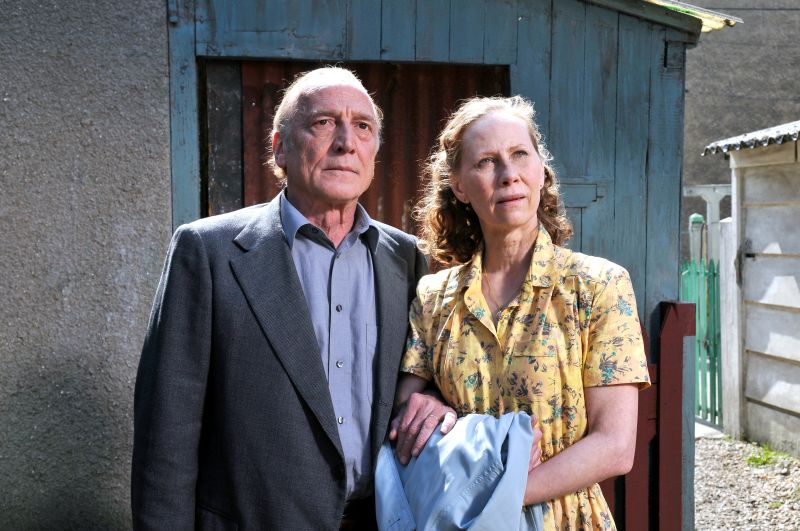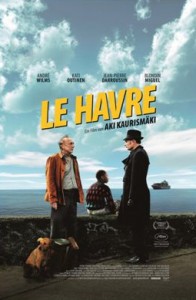Finnish filmmaker Aki Kaurismäki heads to France to enjoy their sense of whimsy, fairy-tale northern seaside towns and happy endings.
Director: Aki Kaurismäki
Writer(s): Aki Kaurismäki
Runtime: 93 minutes
Starring: André Wilms, Kati Outinen, Jean-Pierre Darroussin, Blondin Miguel
Distributor: Sharmill Films
Country: Finland, France, Germany
Rating: Highly Recommended (?)
Aki Kaurismäki has led a sometimes controversial career for the last decade or so, protesting US foreign policy by declining to be a part of the ceremonies for both of his Academy Award nods, including his most acclaimed work, The Man Without a Past. In 2003, he boycotted the famous New York Film Festival for the inability of Iranian director Abbas Kiarostami to secure a visa in time for the trip. This politically active voice is in stark contrast to the films of a very simple cinematic storyteller, one who has influenced the works of Jim Jarmusch who in turn made a cameo in his Leningrad Cowboys Go America. Although primarily setting his films in Helsinki, Le Havre relocates to northern French town of the same name.
Once a bohemian, Marcel Marx (André Wilms) now ekes out a humble existence as a shoe-shiner, visiting his local pub and spending his evenings with wife Arletty (Kati Outinen). When Arletty falls gravely ill, an underage illegal immigrant from Gabon, Idrissa (Blondin Miguel), enters Marcel’s life. Taking it upon himself to look after the boy, the townsfolk all rally to aid Marcel hide him from the authorities, including the fairly ineffective and sympathetic detective Monet (Jean-Pierre Darroussin).
Le Havre is a bubble in time, not nostalgic but rather stubbornly anti-modern. Film buffs might recognise the presence Pierre Étaix, here playing a doctor, but an accomplished filmmaker in his own right. Having worked with the likes of Jacques Tati and Robert Bresson, Kaurismäki is acknowledging not only his own influences but the direct lineage that Le Havre has with those films of the 1960s in particular. Indeed, the presence of retro French rocker Roberto Piazza, better known by his Elvis-like persona Little Bob, captures the essence of the area. Kaurismäki refers to the Le Havre as “the Memphis, Tennessee of France”, although his film makes it seem more Magic Kingdom than Graceland thanks to a gentle and whimsical fairy-tale approach to storytelling.
Like Amélie without the tweeness, Le Havre is so very Gallic in its demeanour, but filtered through the eye of an outsider. Using the same bright colour palette of that film, Kaurismäki and regular cinematographer Timo Salminen create a look that is not entirely real, which is exactly what is needed to ultimately gain buy-in from increasingly cynical filmgoers. It is not a film that aims to change your life, but rather remind us of simple joys, the commonalities we all share and that sometimes, all’s well that ends well.
Le Havre is released in Australia on 29 March 2012 from Sharmill Films.





